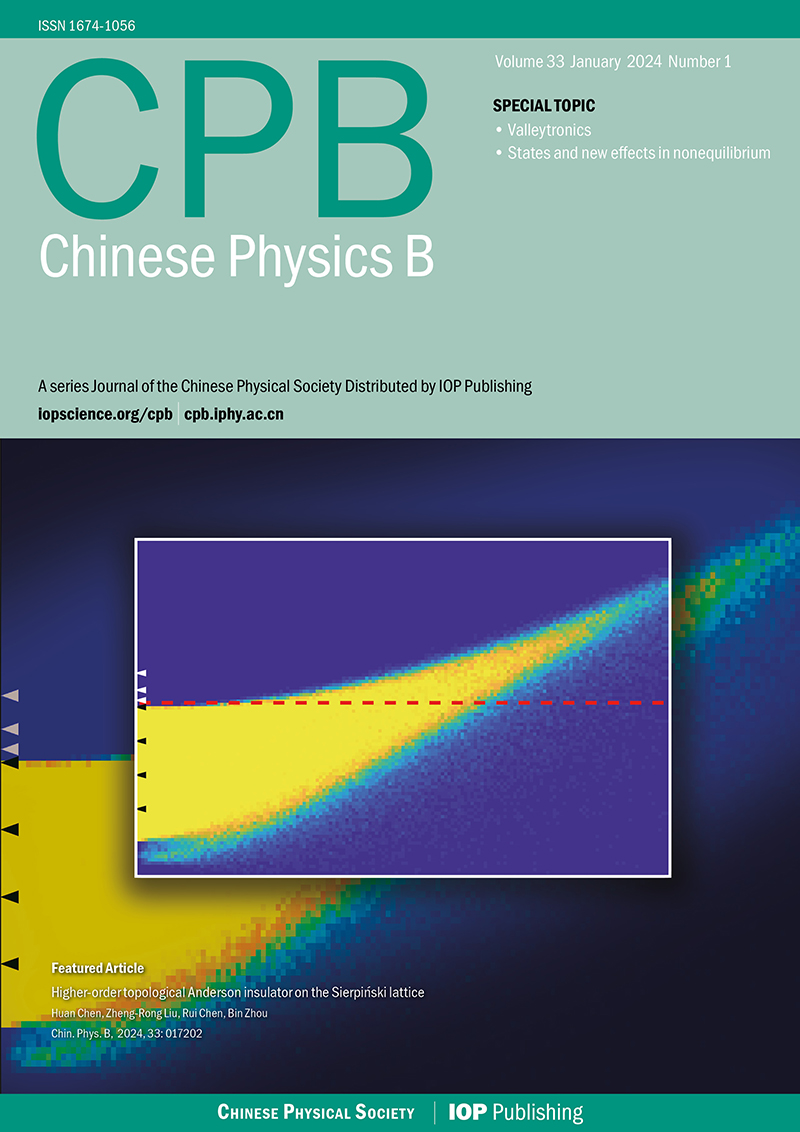Si(111)衬底上单层六方MnTe2的分子束外延生长
IF 1.5
4区 物理与天体物理
Q2 PHYSICS, MULTIDISCIPLINARY
引用次数: 0
摘要
从理论上预测,稳定为1T结构的单层MnTe2是一种二维(2D)铁磁性金属,可以通过应变工程进行调谐。没有自然的范德华(vdW)层状MnTe2体,使得机械剥离不可能制备单层MnTe2。本文采用分子束外延(MBE)技术,在富Te条件下成功地在Si(111)上制备了单层六方MnTe2。尖锐反射高能电子衍射(RHEED)和低能电子衍射(LEED)模式表明,单层是原子平坦的,无需表面重建。Mn4+的价态和([Te]:[Mn])的原子比进一步证实了MnTe2化合物的存在。扫描隧道光谱(STS)表明,六方MnTe2单层是具有大带隙(约2.78 eV)的半导体。角分辨光发射光谱(ARPES)显示,价带最大值(VBM)位于Γ点,在此点以下可以识别出三个具有抛物线色散的空穴型波段。单层MnTe2薄膜的成功合成为研究其二维磁性提供了新的平台。本文章由计算机程序翻译,如有差异,请以英文原文为准。
Molecular beam epitaxy growth of monolayer hexagonal MnTe2 on Si(111) substrate
Monolayer MnTe2 stabilized as 1T structure has been theoretically predicted to be a two-dimensional (2D) ferromagnetic metal and can be tuned via strain engineering. There is no naturally van der Waals (vdW) layered MnTe2 bulk, leaving mechanical exfoliation impossible to prepare monolayer MnTe2. Herein, by means of molecular beam epitaxy (MBE), we successfully prepared monolayer hexagonal MnTe2 on Si(111) under Te rich condition. Sharp reflection high-energy electron diffraction (RHEED) and low-energy electron diffraction (LEED) patterns suggest the monolayer is atomically flat without surface reconstruction. The valence state of Mn4+ and the atom ratio of ([Te]:[Mn]) further confirm the MnTe2 compound. Scanning tunneling spectroscopy (STS) shows the hexagonal MnTe2 monolayer is a semiconductor with a large bandgap of ∼ 2.78 eV. The valence-band maximum (VBM) locates at the Γ point, as illustrated by angle-resolved photoemission spectroscopy (ARPES), below which three hole-type bands with parabolic dispersion can be identified. The successful synthesis of monolayer MnTe2 film provides a new platform to investigate the 2D magnetism.
求助全文
通过发布文献求助,成功后即可免费获取论文全文。
去求助
来源期刊

Chinese Physics B
物理-物理:综合
CiteScore
2.80
自引率
23.50%
发文量
15667
审稿时长
2.4 months
期刊介绍:
Chinese Physics B is an international journal covering the latest developments and achievements in all branches of physics worldwide (with the exception of nuclear physics and physics of elementary particles and fields, which is covered by Chinese Physics C). It publishes original research papers and rapid communications reflecting creative and innovative achievements across the field of physics, as well as review articles covering important accomplishments in the frontiers of physics.
Subject coverage includes:
Condensed matter physics and the physics of materials
Atomic, molecular and optical physics
Statistical, nonlinear and soft matter physics
Plasma physics
Interdisciplinary physics.
 求助内容:
求助内容: 应助结果提醒方式:
应助结果提醒方式:


